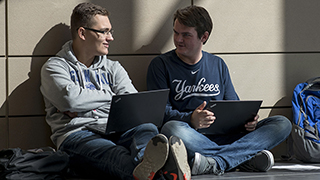Sports Poll Finds Two-Thirds of Fans Say OK for Athletes To Sit Out Due to Mental Health Issues, Think Teams Should Employ Mental Health Counselors
Friday, January 7th, 2022

At the same time, over 70 percent of sports fans think teams should employ mental health counselors just as they do athletic trainers and physical therapists.
These were the findings of a Seton Hall Sports Poll conducted December 8-13, 2021 across the United States using a national representative sample weighted according to gender, age, ethnicity, education, income and geography based on U.S. Census Bureau figures. The Poll had 1,570 adult respondents with a margin of error of +/- 3.2 percent.
The poll was conducted before the widely-covered mid-game departure of Tampa Bay Buccaneers' receiver Antonio Brown on Sunday, January 2. Brown's exit has brought the issue of athletes and mental health back to the forefront as colleagues of the wide receiver and media pundits have raised it as a possible concern.
Details
Asked if it's acceptable for a professional athlete not to compete because of mental
health issues or concerns, 62 percent of the general public (for both individual and
team sports) agreed.
Among sports fans, however, the number who thought it was ok for athletes to take time off due to mental health issues rose to 66 percent for individual sports (only seven percent disagreed, the rest neither agreed nor disagreed) and 67 percent for team sports (only nine percent disagreeing).
"That's an overwhelming level of acceptance among sports fans," said Seton Hall Marketing Professor and Poll Methodologist Daniel Ladik. "Whether you look at individual or team sports – 66 to 7 and 67 to 9 percent respectively – that's better than a 7 to 1 margin who say it's ok not to compete due to mental health concerns. What's more, the support for teams employing mental health counselors in the same way they employ athletic and physical trainers is even greater."
Should Teams Employ Mental Health Counselors?
Sixty-four percent of the general public agreed that pro teams should employ mental
health counselors as they do athletic trainers and physical therapists, a number that
rose to 70 percent among sports fans (with only six percent disagreement among the
general population and a mere five percent among sports fans).
"The movement on this issue is a long time coming," said Professor Charles Grantham, director of the Poll and the Center for Sport Management at Seton Hall's Stillman School of Business. "Care for the whole athlete – especially student-athletes – is essential. Although the rewards can be great, so are the pressures. It is encouraging to see that mental health care now has a more appropriate level of attention and the momentum necessary to make continued strides. And it is good to see that the public supports it – the days of stigmatizing have receded."
College Athletes
Asked about college athletes, the answers were essentially in line with the responses
for pro athletes, with 63 percent of the general population and 68 percent of sports
fans agreeing that it is acceptable not to compete in individual sports, and 62 percent
and 66 percent respectively agreeing that it is acceptable for college athletes not
to compete in team sports because of mental health issues or concerns. On the question
of employing mental health counselors at the college level, 65 percent of the general
population and 71 percent of sports fans agreed.
Impact of Social Media on Mental Health
By a nearly four to one margin the American public and its sports fans believe that
the presence of social media contributes to the mental health issues of athletes more
so than traditional media. Among the general population 47 to 14 percent said social
media had the greater negative impact, while among sports fans the ratio rose to 51
to 12 percent.
"At one point in our nation's sports history, a player could choose to escape the media spotlight by playing in a 'small market' city," said Professor Ladik. "But with the advent of social media there is no escape: the spotlight never dims."
Categories: Business






